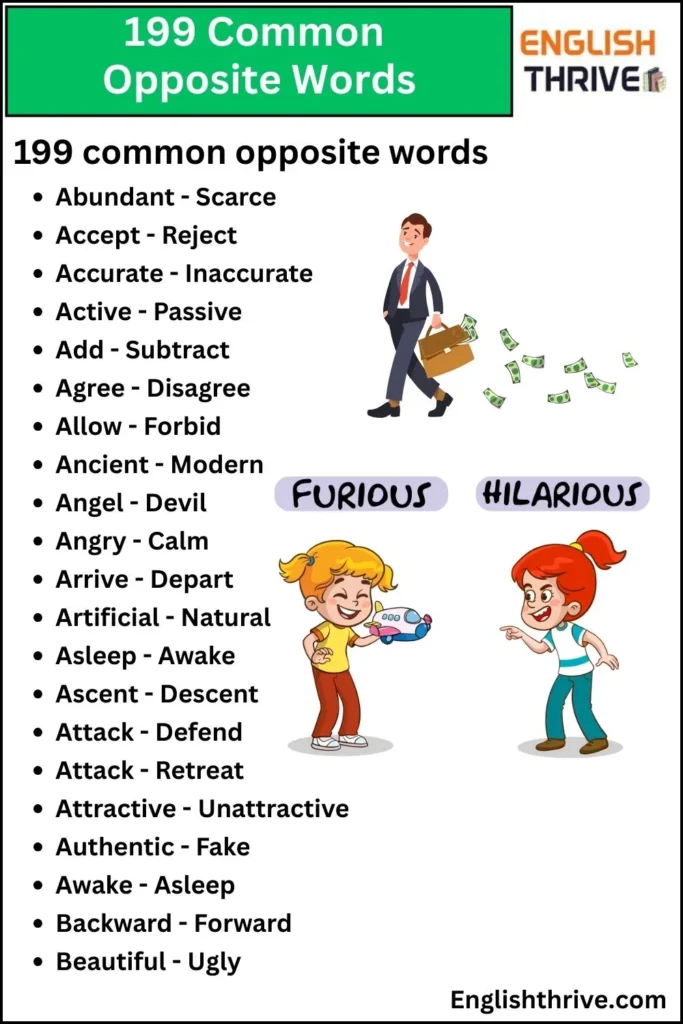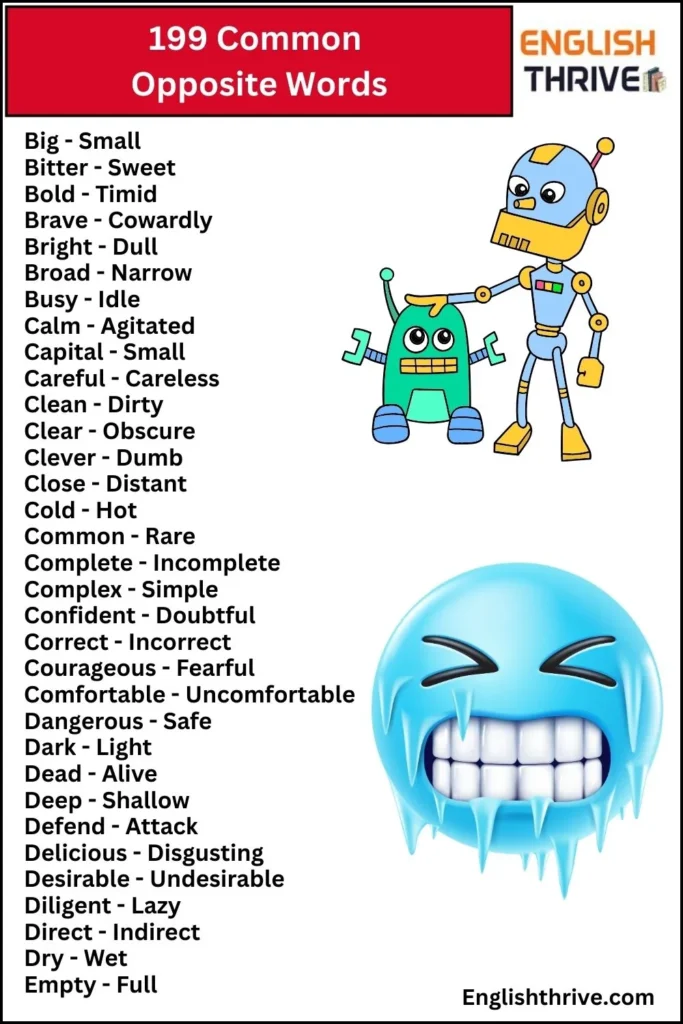If you’re looking to enhance your English vocabulary and communication skills, understanding common opposite words is a great place to start. Opposites, or antonyms, help to add depth and clarity to your conversations and writing by showing contrast and providing a better understanding of different concepts.
Whether you’re a student aiming to improve your language skills or simply someone looking to speak more fluently, knowing common opposite words will make your language more dynamic and engaging.
In this blog, we’ll explore a variety of opposites, from simple words you use every day to more complex ones that can elevate your speech and writing. So, let’s dive in and discover how these antonyms can make your communication clearer and more effective!

Contents
Toggle199 common opposite words
Abundant – Scarce
Accept – Reject
Accurate – Inaccurate
Active – Passive
Add – Subtract
Agree – Disagree
Allow – Forbid
Ancient – Modern
Angel – Devil
Angry – Calm
Arrive – Depart
Artificial – Natural
Asleep – Awake
Ascent – Descent
Attack – Defend
Attack – Retreat
Attractive – Unattractive
Authentic – Fake
Awake – Asleep
Backward – Forward
Beautiful – Ugly
Begin – End
Better – Worse
Big – Small
Bitter – Sweet
Bold – Timid
Brave – Cowardly
Bright – Dull
Broad – Narrow
Busy – Idle
Calm – Agitated
Capital – Small
Careful – Careless
Clean – Dirty
Clear – Obscure
Clever – Dumb
Close – Distant
Cold – Hot
Common – Rare
Complete – Incomplete
Complex – Simple
Confident – Doubtful
Correct – Incorrect
Courageous – Fearful
Comfortable – Uncomfortable
Dangerous – Safe
Dark – Light
Dead – Alive
Deep – Shallow
Defend – Attack
Delicious – Disgusting
Desirable – Undesirable
Diligent – Lazy
Direct – Indirect
Dry – Wet
Empty – Full
Equal – Unequal
Exciting – Boring
Expensive – Cheap
Fail – Succeed
Fast – Slow
Fat – Thin
Few – Many
Final – Initial
First – Last
Flat – Bumpy
Foolish – Wise
Freedom – Captivity
Friendly – Hostile
Full – Empty
Generous – Stingy
Gentle – Rough
Get – Give
Give – Take
Good – Bad
Happy – Sad
Hard – Soft
Harsh – Gentle
Healthy – Unhealthy
Heavy – Light
High – Low
Hot – Cold
Huge – Tiny
Inactive – Active
Incompetent – Competent
Innocent – Guilty
Interesting – Dull
Invisible – Visible
Jealous – Content
Joyful – Miserable
Kind – Cruel
Large – Small
Late – Early
Laugh – Cry
Light – Heavy
Loose – Tight
Lost – Found
Low – High
Lucky – Unlucky
Male – Female
Mature – Immature
Maximum – Minimum
Minor – Major
Modern – Ancient
Narrow – Wide
Natural – Artificial
Neat – Messy
New – Old
Noisy – Quiet
Normal – Abnormal
Open – Closed
Opposite – Same
Optimistic – Pessimistic
Orderly – Disorderly
Over – Under
Overweight – Underweight
Patient – Impatient
Polite – Rude
Positive – Negative
Powerful – Weak
Practical – Impractical
Proud – Humble
Quiet – Noisy
Rich – Poor
Right – Wrong
Rude – Polite
Safe – Dangerous
Same – Different
Sane – Insane
Secure – Insecure
Sensitive – Insensitive
Sharp – Dull
Short – Tall
Shy – Outgoing
Sick – Healthy
Simple – Complex
Sincere – Insincere
Soft – Hard
Strong – Weak
Sweet – Sour
Temporary – Permanent
Thin – Thick
Tight – Loose
Timid – Brave
Tiny – Huge
Top – Bottom
Transparent – Opaque
True – False
Ugly – Beautiful
Uncertain – Certain
Uncommon – Common
Unhappy – Happy
Unusual – Usual
Warm – Cool
Weak – Strong
Wet – Dry
Wide – Narrow
Wild – Tame
Win – Lose
Wise – Foolish
Young – Old
Zero – Hero
Able – Unable
Abundant – Scarce
Active – Passive
Addictive – Non-addictive
Agitated – Calm
Altruistic – Selfish
Beneficial – Harmful
Bright – Dull
Brilliant – Mediocre
Broad – Narrow
Broken – Fixed
Clean – Dirty
Clear – Cloudy
Cold – Hot
Comfortable – Uncomfortable
Cooperative – Uncooperative
Correct – Incorrect
Courageous – Timid
Dark – Light
Decent – Indecent
Equal – Unequal
Expensive – Cheap
Fair – Unfair
Firm – Weak
Fresh – Stale
Generous – Greedy
Great – Mediocre
Healthy – Sick
Honorable – Dishonorable
Honest – Deceptive
Humble – Arrogant
Intelligent – Unintelligent
Intelligent – Dumb
Light – Dark
Moderate – Extreme
Shiny – Dull
Tight – Loose

Consolation on common opposite words
To wrap things up, exploring common opposite words is essential for expanding your vocabulary and enhancing your communication skills. By learning and practicing antonyms, you can convey your ideas more clearly and effectively. These common opposite words provide a simple yet powerful way to make your language more engaging, whether you’re writing, speaking, or simply trying to improve your fluency.
As you continue to incorporate these opposites into your everyday language, you’ll notice an improvement in both your understanding and usage of English. Keep experimenting with these opposites in your conversations and writings to sound more natural and confident. With time, using antonyms will become second nature, allowing you to communicate more dynamically.

